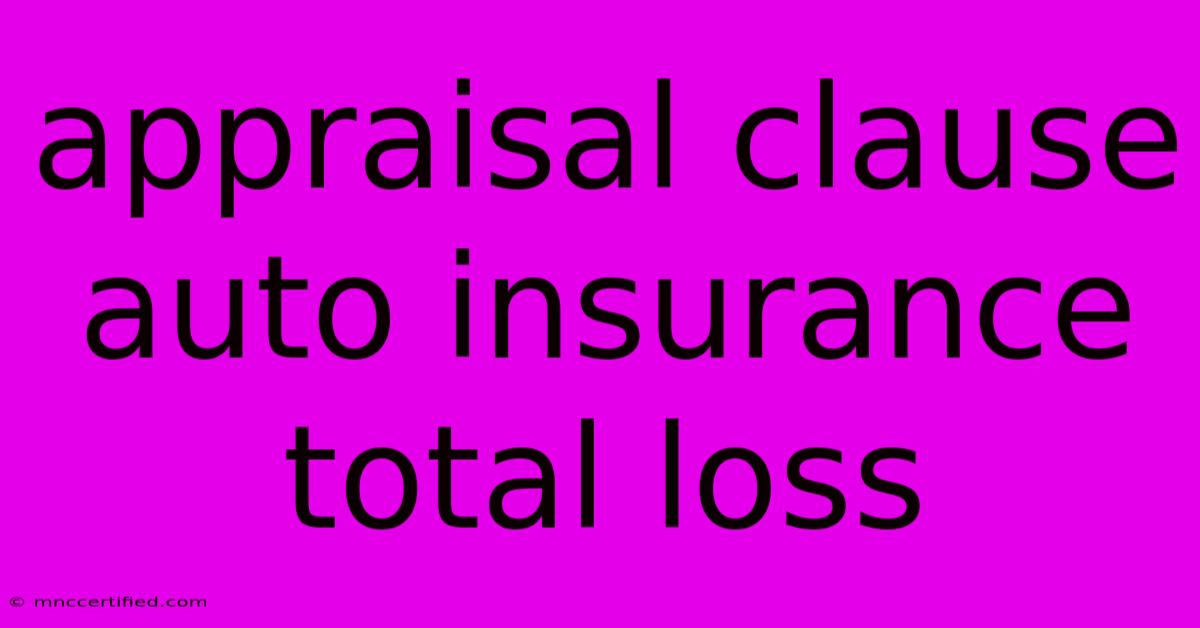Appraisal Clause Auto Insurance Total Loss

Table of Contents
Demystifying the Appraisal Clause: Navigating Total Loss Claims in Auto Insurance
Navigating a car accident, especially a total loss, can be a stressful experience. Understanding your insurance policy and the intricacies of the appraisal clause is crucial to ensure you receive fair compensation. This article will shed light on the appraisal clause and its role in resolving total loss claims.
Understanding the Appraisal Clause
The appraisal clause is a standard provision found in most auto insurance policies. It acts as a dispute resolution mechanism when you and your insurance company disagree on the actual cash value (ACV) of your totaled vehicle. The ACV is essentially the fair market value of your car before the accident, factoring in depreciation and condition.
Here's how it works:
- Disagreement: If you and your insurer can't agree on the ACV, you can trigger the appraisal clause.
- Appraisers Appointed: Both you and the insurance company each choose a qualified, impartial appraiser.
- Third Appraiser: These two appraisers select a third, neutral appraiser.
- Valuation Determination: The three appraisers evaluate the vehicle's condition and determine its ACV.
- Binding Decision: The majority decision of the three appraisers is binding on both you and the insurance company.
When to Use the Appraisal Clause
The appraisal clause is a valuable tool when:
- Your insurance company offers a significantly lower ACV than you believe is fair.
- You have evidence to support a higher ACV, such as recent repair bills or a vehicle appraisal.
- Negotiations with your insurer have reached an impasse.
It's important to note: You typically have a limited timeframe (often 30-60 days) to invoke the appraisal clause after receiving your insurer's initial ACV offer.
Benefits of the Appraisal Clause
The appraisal clause provides several benefits for policyholders:
- Impartial Evaluation: It ensures an objective assessment of your vehicle's value by qualified professionals.
- Fair Compensation: It helps you receive a more accurate and potentially higher payout for your totaled vehicle.
- Dispute Resolution: It offers a structured and neutral process for resolving disputes with your insurance company.
Tips for Utilizing the Appraisal Clause
- Document Everything: Keep a detailed record of all communications, repair bills, and appraisals related to your claim.
- Thorough Research: Choose reputable and qualified appraisers who specialize in vehicle valuation.
- Negotiate: Don't hesitate to negotiate with your insurer even after invoking the appraisal clause.
- Legal Counsel: Consider consulting with an attorney if you're unsure about the process or have complex claims.
Conclusion
The appraisal clause is a powerful tool in your arsenal when navigating total loss claims. By understanding its purpose, benefits, and how to utilize it effectively, you can increase your chances of receiving fair compensation for your totaled vehicle. Remember, it's crucial to act proactively and ensure you thoroughly document all aspects of the process.

Thank you for visiting our website wich cover about Appraisal Clause Auto Insurance Total Loss. We hope the information provided has been useful to you. Feel free to contact us if you have any questions or need further assistance. See you next time and dont miss to bookmark.
Featured Posts
-
Jensens Shetland Filming No Spoilers
Nov 07, 2024
-
Gold Bond Medicated Powder Kills Bed Bugs
Nov 07, 2024
-
Trumps Election Ukraine War Aid Concerns
Nov 07, 2024
-
Can You Insure A Car Without Registration
Nov 07, 2024
-
Trump Inauguration Day Date And Details
Nov 07, 2024